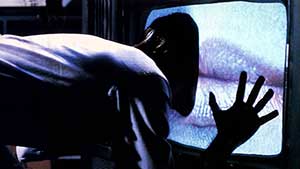Dear Television,
Look at you, all grown up. Nudity, foul language, and Steve Buscemi. I hardly recognize you anymore. Of course, much of that has to do with the fact that you're no longer exactly what people used to call television. Sometimes elective surgery can be a good thing.
For decades, the nicest thing you could have said about yourself was that you were free. Ironically, it was not until people started paying for you, one way or another, that you became something other than a delivery system for commercials every twelve minutes or so.
In the mid to late 80s, with the advent of Beta and VHS cassettes, miniseries' began to be marketed as complete works, sans commercials. They found their way into video stores and people's homes—usually event programming like Shogun or Rich Man, Poor Man. All of a sudden television wasn't just what was being broadcast at any particular hour. People could choose when and how they watched their programs. Incidentally, this new marketing strategy also showed creative types what possibilities might exist for long form television, stripped of the structural constraints that were, until then, endemic to your form.
Coupled with the meteoric improvement in base technology (you used to have screens not much larger than an iPad) as well as production quality, what was being broadcast into people's homes came more and more to mimic the gold standard. HBO and it's imitators began to make shows that not only eschewed the usual rigid structural constraints of network television, but began to introduce content that you would have blushed at in your Mary-Ann and Ginger days.
In brief, you came more and more to resemble the very thing that had held you at arm's length for decades: cinema. Until that moment, your only point of contact with your older, more sophisticated sibling had been Love Boat guest shots for faded stars.
Cinema and its adherents had long held you in contempt—like a child everyone wished had stayed hidden in the basement, eating fish heads. But that all changed once emerging specialty channels began to demonstrate the valuable demographics they were able to pull—and what kind of creative freedom those markets promised.
The distinctions between the two forms – cinema and whatever you are becoming – are now breaking down so quickly that we will probably have to come up with a new word. Cinevision, or something similarly trite. But the transition is not complete yet, and the distinctions are not simply technical.
In the same way that you can easily watch a film at home without losing much of the experience, technically or atmospherically, I have also been to more than a few Dr. Who cinema experiences. National Geographic also plays regularly on IMAX screens, and it's not strange at all to see something that straddles both medias, like Joss Whedon's Firefly/Serenity.
The thing you are not, though, is the soul of wit. Concision is not your strong suit. Not yet, anyways. The very thing that you offer as your greatest gift: the richness and possibilities of long form story telling, is the quality that limits you most.
Taxi Driver would flail as anything other than a tight 114 minutes. Birdman can only exist at 119 minutes—not a minute more. Some creations are not meant to live long lives. Just fierce, brief ones.
As much as the technical aspects have equalized, and as much as we're seeing the same actors and directors, these two forms – film and television – are still as disparate as books and music, theater and sculpture. It's not that you cannot successfully adapt something as profoundly well-executed as Fargo, or competently rework the curiously epicurean world of Hannibal. It's just that in doing so you change them fundamentally.
The feeling you get at the conclusion of Deadwood or The Hour, as opposed to stepping out of an experience like Children of Men, is a subtle one, but – for me, anyways – profound. Amelie, and more recently Michael Haneke's Amour, are also superb examples of stories that would collapse under their own weight if they were stretched out to accommodate the scope of a miniseries. You could produce something with similar themes, even with the same participants, that may well be outstanding. But it will never duplicate the intensity and impact of those two hours in the dark.
Personally, I'm glad you look the way you do. Just yesterday I witnessed an excellent example of what you do so well: a Welsh/BBC series called Hinterland. Great writing, interesting visuals, competent performances. The strange thing was that the very first episode was ninety minutes long, self-contained, and gave no previous context for the world or characters.
It didn't bite in quite the same way. There was a restraint inherent in the storytelling, a tendency to bow to the one expediency television can never escape: that there is always a next episode.
Sincerely,

Tim






